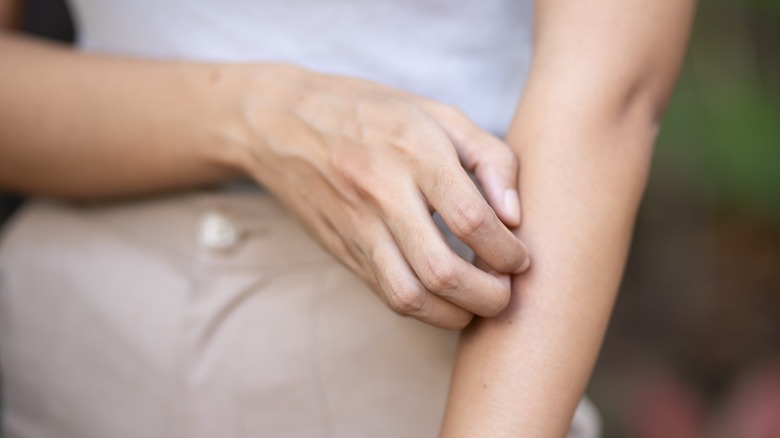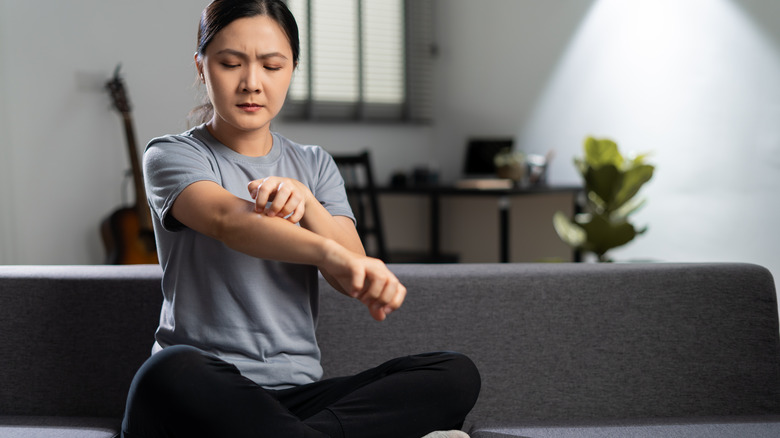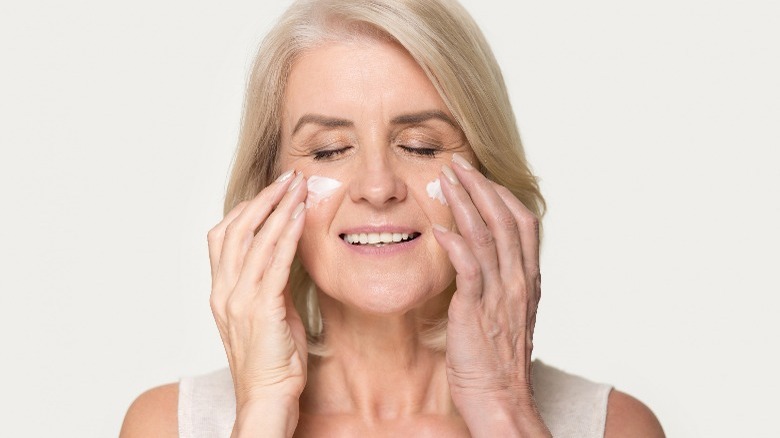Why Your Skin Might Feel Itchier As You Age
As you've gotten older, you've learned to stock up on anti-aging creams and SPF to ward off sun damage, but you might also want to add an anti-itch ointment to your medicine cabinet. The phrase "aging skin" may have you imagining fine lines and sun spots, but the changes you might notice over time can be more than skin-deep. Cleveland Clinic explains that the appearance of facial skin can evolve due to a loss of fat, bone, and cartilage underneath. And even on the surface, you may notice more than new wrinkles — transparency, bruises, and skin lesions can become more common with age.
Another age-related skin symptom: itchiness. According to a 2013 study published in Dermatologic Therapy, itchiness is the most common skin issue elderly patients face. While some may experience irritation all day, others notice it only at night, a condition called nocturnal pruritus, according to Water's Edge Dermatology.
So why does your skin feel itchier as you get older? Here's what the science says — and what to do about it.
Feeling itchy? Here's why
Itchiness that worsens with each birthday could be related to several factors. First, Mayo Clinic explains that skin gets drier with age, which can cause irritation and pruritus. For women, the cause often comes down to hormones, explains WebMD. Before and during menopause, estrogen, the hormone responsible for oil production in the skin, significantly drops. As hormone levels change, the skin often struggles to retain moisture, leading to dry, itchy skin.
Besides dry skin, itchiness can happen due to changes in histamine reactivity in the body. Histamines are the chemicals produced by the immune system to fight off allergens (per WebMD). A 2011 study published in Allergy, Asthma & Immunology found that older women have less histamine skin reactivity. You might notice more flare-ups when facing an allergy trigger as you age.
Science also points out that some older adults with alloknesis suffer from chronic itch. Alloknesis causes skin sensitivity in older people, where even the lightest touch can provoke irritation.
How to soothe itchy skin
To get rid of that pesky, crawly feeling on your skin, it's wise first to make an appointment with a medical professional. A dermatologist can ensure your itch isn't related to a more severe condition, such as skin cancer, commonly diagnosed in older adults, per the American Cancer Society.
Avoid repeatedly scratching chafed spots – WebMD warns that doing so might cause infections, broken skin, and scarring. Instead, the American Academy of Dermatology Association recommends soaking in an oatmeal bath, cooling the skin with a cold compress or product containing icy menthol or calamine, and applying anti-itch creams.
If dry skin is the root of the problem (you can identify dryness by flakiness, peeling, and a burning or stinging sensation), regularly slather on moisturizers and wash with moisturizing soaps (per Healthline). Also, consider taking lukewarm — not hot! — showers and turning on a humidifier in your home.
Women experiencing oil and moisture loss due to menopause can make dietary changes to balance the skin, according to Women's Health Network. Restore hydration by upping your vitamin C, sulfur, omega-3 fatty acids, and vitamin D intake.


